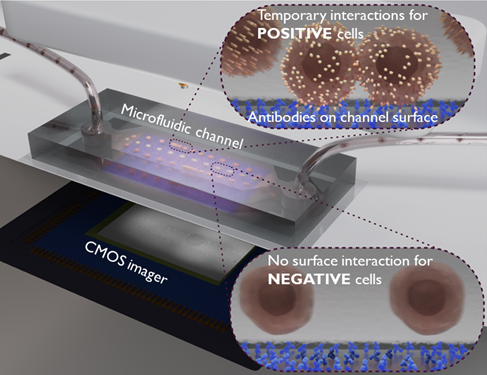Novel microfluidic approaches for label-free CAR-T cell characterization
Master projects/internships - Leuven | Just now
Streamlining CAR-T Cell Production with Innovative Microfluidic Techniques
Cell-based therapy is an innovative approach in modern medicine, offering personalized treatments for a variety of diseases, with CAR-T therapy serving as a notable example in the field of cancer immunotherapy. A critical step in this process is the accurate characterization and classification of immune cells in their natural state. Conventional techniques like flow cytometry rely on fluorescence labeling, which alters the natural environment of cells and complicates sample preparation. These limitations make it less suitable for use in CAR-T cell production. To address these limitations, imec has developed a label-free microfluidic platform that uses computational imaging and interactions with antibody-functionalized surfaces to characterize cells. This method maintains cell integrity and is designed to be directly integrated into the production workflow for therapeutic applications.
At present, a remaining challenge is to improve cell-to-surface contact within the microfluidic channels, as well as to demonstrate differentiation for multiple cell types through the use of diverse antibody surfaces. Additionally, the method's potential to provide detailed characterization of cell surface marker expression through interaction profile analysis is yet to be fully explored.
This thesis aims to address the abovementioned challenges and opportunities for label-free cell characterization. The student will study and implement novel microfluidic designs and measurement strategies to improve cell-surface interaction. Furthermore, different cell types and antibody-surfaces will be explored towards integrating the approach for multiple cell marker analysis. Finally, the student will perform detailed analysis of the transient cell-surface interaction profiles to assess the potential of this approach for enhanced cell characterization.
We are looking for an enthusiastic master thesis or internship candidate with a background in (bio)chemistry, nanotechnology, or biomedical engineering. Under supervision of a multidisciplinary team, the student is able to perform independent, hands-on work in a laboratory environment, particularly focusing on microfluidic cell experiments. The student is ideally proficient with image processing and data analysis, and can communicate results efficiently. The results of this work will contribute to the advancement of cell characterization with the potential to further improve CAR-T cell therapy processes.

Type of Project: Thesis; Internship
Master's degree: Master of Science; Master of Bioengineering
Master program: Nanoscience & Nanotechnology
Duration: 9 to 12 months
Supervisor: Philippe Vereecken (Bioscience, Nano)
For more information or application, please contact the supervising scientists Philippe Vereecken (philippe.vereecken@imec.be) and Thijs Roebroek (thijs.roebroek@imec.be).
Imec allowance will be provided for students studying at a non-Belgian university.
